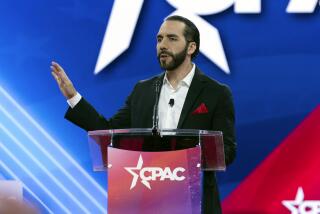We Don’t [Love] Stinkin’ Yankee Running Dog Warmongers
To some, the United States is a global protector, to others it’s a predatory “hyperpower.” As President Bush tours Europe this week, he’ll no doubt gather mental postcards of some fairly large crowds. Will the faces be smiling or contorted in rage? How will Europe’s leaders play those throngs? And will the Continent’s current wave of anti-Americanism be a political force in future elections or peter out? Here’s a glance at how recently elected leaders worldwide have fared by bashing (or saluting) the United States. — Michael Soller
Venezuela
Hugo Chavez
The president has long annoyed Washington with his ties to Fidel Castro, his refusal to cooperate with the U.S.-run anti-drug effort and his inflammatory rhetoric. “Who is to blame for the violence that has been unleashed in Iraq in the last year?” he asked in a speech last April. “Is it Saddam Hussein? Is it those who they call Islamic fundamentalists? No, the blame for all those deaths has a name: George W. Bush.”
Outcome: Chavez defeated a recall referendum last August with nearly 60% of the vote.
Germany
Gerhard Schroeder
Seeking an edge in a tight reelection campaign in 2002, the chancellor defied U.S. pressure to commit troops to an Iraq invasion. “We’re not available for adventures,” he said a month before the election.
Outcome: Many analysts thought Schroeder’s last-minute push-back to the U.S. helped put him over the top. His party won by 1% of the vote.
El Salvador
Tony Saca
U.S. popularity is falling across Latin America, especially in South America, where nearly 60% have a negative perception of the U.S. But Central America, and especially El Salvador, is the exception. Salvadorans retain a positive image of Saca, a former sports announcer and U.S. supporter. During last March’s presidential election, Saca promised to protect the “remittances” sent from Salvadorans living in the U.S. His opponent, Schafik Handal, a former communist guerrilla leader, bashed “neoliberal policies and the Washington consensus.”
Outcome: Saca won the election handily. The main opposition party boycotted his inauguration over his support for the country’s 380 troops in Iraq, but the troops — and Saca — remain in place.
South Korea
Roh Moo-hyun
Roh, running to replace outgoing President Kim Dae Jung, said he wouldn’t “kowtow” to the United States, and anti-American feeling ran high a month before the December 2002 presidential election when two GIs accused of running over two schoolgirls were acquitted of charges of negligent homicide. About 15,000 protesters called for the withdrawal of U.S. troops stationed on the border with North Korea.
Outcome: After winning the election, Roh turned conciliatory, sending 3,700 troops to Iraq — even as the U.S. announced troop cuts in South Korea, a move some saw as payback for his anti-American politics.
Australia
John Howard
The incumbent prime minister made no secret of his support for the U.S. during his campaign for a fourth term last year. His opponent, Labor Party leader Mark Latham, labeled Bush “the most incompetent and dangerous president in living memory” and said he would bring most of Australia’s 850 troops in Iraq home.
Outcome: Economics trumped anti-Americanism as Howard won in October.
Spain
Jose Luis Rodriguez Zapatero
Running against the chosen successor of U.S. ally Prime Minister Jose Maria Aznar, Socialist Zapatero proclaimed his government would not “submit” to U.S. policy and promised to pull 1,300 Spanish troops out of Iraq. A month before last March’s election, he rejected the Bush administration’s claims about Iraqi weapons of mass destruction as “a false and unacceptable pretext for Bush and his allies to engage in a war on the margins of international law.”
Outcome: Just three days after a group with links to Al Qaeda killed 200 people with a car bomb at a Madrid train station, Zapatero’s party won the parliamentary election with the help of 2 million first-time voters, many of them opponents of the U.S. invasion of Iraq. “You can’t organize a war with lies,” Zapatero said in his victory speech.
More to Read
A cure for the common opinion
Get thought-provoking perspectives with our weekly newsletter.
You may occasionally receive promotional content from the Los Angeles Times.






